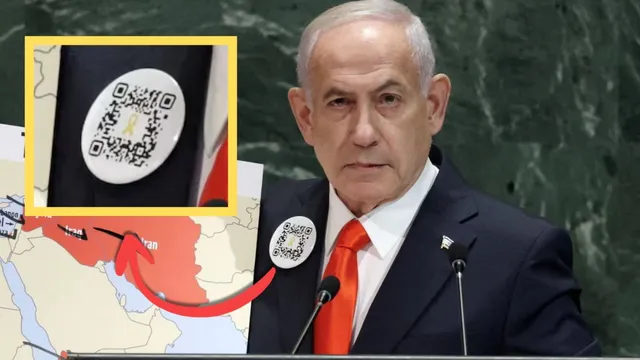- By Supratik Das
- Sat, 27 Sep 2025 06:51 PM (IST)
- Source:JND
Israeli Prime Minister Benjamin Netanyahu made headlines at the United Nations General Assembly (UNGA) on Friday by wearing a QR code pinned to his lapel, urging delegates and global viewers to scan it to understand Israel’s perspective on the ongoing conflict in Gaza.
Addressing what he described as an “empty hall” due to a walkout by diplomats, Netanyahu said, “You see this large pin here. It’s a QR code. What I ask you to do is hold up your phone, zoom in, and you too will see why we fight and why we must win. It’s all in here.” According to his office, the QR code links to graphic footage and images of Hamas attacks that occurred on October 7, 2023, in southern Israel, warning viewers that “extreme viewer discretion is advised.”
Walkout Protest Highlights Global Divisions
Netanyahu’s speech came amid a significant protest by international delegates. As he took the stage as the first speaker on the fourth day of the 80th UNGA session, numerous diplomats walked out in response to the Israeli military’s ongoing operations in Gaza. Reports indicate that over 60,000 Palestinians have lost their lives since October 7, following Hamas’s cross-border attacks that killed over 1,200 Israelis and led to hundreds of hostages being taken.
Despite the walkouts, Netanyahu remained resolute, asserting that Israel’s actions were necessary for national security and targeting Hamas militants. “Israel must finish the job,” he said, adding that Western leaders may have “buckled under the pressure,” but Israel would not.
Netanyahu’s Key Messages At UNGA
During his nearly half-hour address, Netanyahu underlined a series of positions central to Israel’s ongoing strategy:
• The war could end immediately if Hamas returned hostages, disarmed, and allowed for the demilitarisation of the Gaza Strip.
• Israel “must finish the job against Hamas” and cannot afford to stop midway.
• Western leaders may have “buckled under pressure,” but Israel will not change course.
• More than 150 countries may recognise a Palestinian state, but such moves will “encourage further violence against Jews.”
• Iran’s role as a regional destabiliser remains the “biggest threat to peace and security,” and Israel has struck blows against Tehran’s allied groups across the region.
• Anti-Semitism remains persistent worldwide, and Israel will not allow its enemies to use it as a justification for violence.
Netanyahu’s address comes at a time when Israel is under rising pressure from global powers to halt its operations. US President Donald Trump has already said he would not permit Israel to annex the West Bank, a sentiment echoed by the UK and Germany. Critics have also pointed to Israel’s approval of controversial settlement projects that could derail any chances of a two-state solution.
ALSO READ: Phones, Loudspeakers, And Protests: How IDF Hijacked Gaza Devices To Amplify Netanyahu’s UN Speech
Part of Wider Public Diplomacy Effort
Netanyahu’s QR code at the UN forms part of a broader Israeli campaign in New York. Billboards and digital screens near the UN headquarters and in Times Square display the slogan “Remember October 7,” linking to the same website with footage and images of Hamas attacks. Israeli officials described this move as an effort to provide global audiences with direct evidence of the attacks and the rationale for Israel’s military actions.
ALSO READ: Trump Confident About 21-Point Gaza Peace Deal, Vows To Resolve Hostage Crisis Amid Protest
Addressing accusations of a genocide in Gaza, Netanyahu rejected such claims, describing them as “baseless” and arguing that any civilian casualties were a result of Hamas’s strategies rather than Israel’s operations. He also countered claims of a humanitarian blockade, stating that Gaza had access to food and essential supplies, but accused Hamas of diverting resources.

